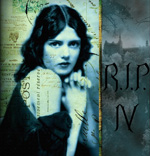John Gardner’s novel Grendel has been on my reading list for years. I have picked it up and read the first chapter or two several times. This time, the confluence of the R.I.P. Challenge and the fact that I am teaching Beowulf provided me with two excellent reasons to finish.
Beowulf is, of course, our earliest epic in English. It tells the story of a mighty Geatish warrior named Beowulf who comes to King Hrothgar’s meadhall in Denmark to help Hrothgar and the Danes with their monster problem: a creature named Grendel has been attacking the meadhall for twelve years. In Beowulf, Grendel represents the essence of evil. His motives are not examined aside from a note that he descends from Cain, which should explain everything. My own students became intrigued by Grendel’s story, and we did discuss his motives. I mentioned I was reading this book. Our library’s copy immediately disappeared, and I think some of my students have been waiting for me to finish reading my copy so that I could loan it out. As it turns out, Grendel’s motives, at least as John Gardner imagines them, are a little more complex than a descent from evil beings or jealousy of mankind.
Gardner tells the story of Grendel’s war against Hrothgar, as he calls it, from Grendel’s point of view. Gardner’s Grendel is on a quest to find meaning and determine his place in the world. The novel begins before events in Beowulf really start. Grendel watches as Hrothgar becomes king and builds his meadhall, and he watches Hrothgar gain power as his kingdom grows. Grendel is mesmerized by the man he calls the Shaper, who spins stories of the greatness of the Danes. Grendel remembers being present when the truth occurred, and yet he, like the Danes, wants to believe the Shaper’s stories. When Beowulf himself arrives toward the end of the novel, Grendel is drawn to him and mesmerized by him, a feeling echoed by Beowulf himself in the epic when he says he believes that he and Grendel have been drawn together in this fight.
Gardner’s creature is not the creature of the epic poem. He’s as vicious, but more thoughtful, and the Danes are not as great a people or as innocent as the epic’s composer would have us believe. Gardner, a professor of English, would of course have been familiar with the epic. Parts of the story in the epic are told again through Grendel’s eyes in this novel. I particularly liked the scene in which Unferth, the thane who challenged Beowulf’s prowess and was quickly shut down, challenges Grendel—interesting comment on heroism. Grendel’s description of the charismatic Beowulf were fun to read, too. We also have an interesting picture of Grendel’s mother. This book ends before her battle with Beowulf, of course, because Grendel dies before that time, but it’s hard to see, based on Grendel’s description of her, how she had the sentience to carry out her attack on Heorot. I enjoyed this novel, and I think we’re going to have to put it in the early British literature curriculum at my school. The novel’s ideas about the nature of good and evil and who frames history will make for interesting discussion.
 This is the second book I’ve finished in the R.I.P. Challenge (the first being Coraline). I am still reading Dracula. I will start Joe Hill’s collection of short stories 20th Century Ghosts next. With two of the four books down before September is out, I’m feeling more confident that I’ll finish the challenge. I love taking challenges on, but I have a lot of trouble finishing them. Perhaps this year is my year.
This is the second book I’ve finished in the R.I.P. Challenge (the first being Coraline). I am still reading Dracula. I will start Joe Hill’s collection of short stories 20th Century Ghosts next. With two of the four books down before September is out, I’m feeling more confident that I’ll finish the challenge. I love taking challenges on, but I have a lot of trouble finishing them. Perhaps this year is my year.